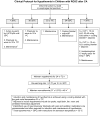How I cool children in neurocritical care
- PMID: 20146026
- PMCID: PMC3221013
- DOI: 10.1007/s12028-010-9334-5
How I cool children in neurocritical care
Abstract
Brain injury is the leading cause of death in our pediatric ICU [Au et al. Crit Care Med 36:A128, 2008]. Clinical care for brain injury remains largely supportive. Therapeutic hypothermia has been shown to be effective in improving neurological outcome after adult ventricular-arrhythmia-induced cardiac arrest and neonatal asphyxia, and is under investigation as a neuroprotectant after cardiac arrest and traumatic brain injury in children in our ICU and other centers. To induce hypothermia in children comatose after cardiac arrest we target 32-34 degrees C using cooling blankets and intravenous iced saline as primary methods for induction, for 24-72 h duration with vigilant re-warming. The objective of this article is to share our hypothermia protocol for cooling children with acute brain injury.
Figures
References
-
- Au AK, Carcillo JA, Clark RS, Bell MJ. Brain injury contributes to greater than 90% of deaths in previously healthy children in the PICU. CCM. 2008;36:A128.
-
- Adelson PD, Ragheb J, Kanev P, et al. Phase II clinical trial of moderate hypothermia after severe traumatic brain injury in children. Neurosurgery. 2005;56:740–54. discussion -54. - PubMed
-
- Fink EL, Clark RSB, Kochanek PM, Watson RS. Mild therapeutic hypothermia in a cohort of patients surviving cardiac arrest. CCM. 2007;35:A97.
-
- Association AH. 2005 American Heart Association (AHA) guidelines for cardiopulmonary resuscitation (CPR) and emergency cardiovascular care (ECC) of pediatric and neonatal patients: pediatric advanced life support. Pediatrics. 2006;117:e1005–28. - PubMed
-
- Adelson PD, Bratton SL, Carney NA, et al. Guidelines for the acute medical management of severe traumatic brain injury in infants, children, and adolescents. Chapter 14. The role of temperature control following severe pediatric traumatic brain injury. Pediatr Crit Care Med. 2003;4:S53–5. - PubMed
Publication types
MeSH terms
Grants and funding
LinkOut - more resources
Full Text Sources
Medical


